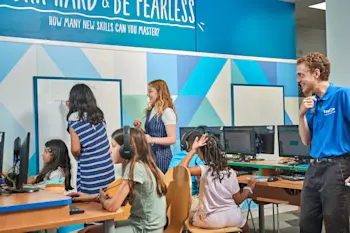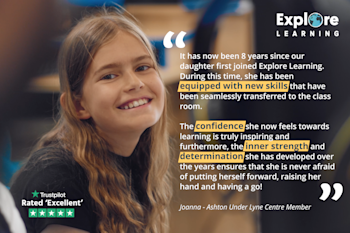How to read school reports: A parent survival guide

Wondering how to read your child’s school report to know how to best give them extra support?
Discover everything you need to know about school reports, how to use them for parents’ evenings, and decode the language teachers use.
What is a school report?
School reports begin in primary school and are teacher assessments about your child’s behaviour and performance at school.
They can be a great indicator of how settled your child is at their school, how they’re finding specific subjects, and what areas they need to continue striving towards.
In the annual school report there should be:
A brief overview of achievements in the school curriculum and comments on general progress
Arrangements for discussing the report with the teacher
Attendance record
Results of any public exams taken with subject and grade
Are school reports a legal Ofsted requirement?
Schools are required to send at least 1 written report per school year, however, no matter the Key Stage, lots of schools split the report across the academic school year, reporting on each term separately. By the end of each summer term, your child’s teacher must send a written report to you on your child’s progress for the academic year.
As an Explore member, you’ll receive real-time feedback to keep you on track with your child’s progress.
The purpose of school reports
School reports can be very valuable for parents, a proud moment to highlight your child’s recent progress achievements! They can also be used as a reflection tool to see if teachers’ predictions and comments were achieved.
The main purpose of a school report is to keep you updated about your child’s progress and to keep lines of communication open between home and school.
Manager Emma, who works at Explore Learning and has previously taught in schools, shares her thoughts:
'Making sure parents are aware of their child’s current achievements and any tricky areas of the curriculum, is vital for supporting a child’s progress. This allows education staff and parents to work together, so the support for those tricky concepts can continue at home too. This information can be shown to parents in their child’s school reports and in parents’ meetings, but I feel the real impact happens with ‘Assessment for Learning’. This is on the spot constructive feedback for your child, that they can act upon, in the moment, to improve their work.
This is something we pride ourselves on at Explore Learning, while also keeping you up to date with their progress. School reports are important to keep communication lines open, but it is clear and constructive feedback children need to achieve.’
How to read a school report
Explore Learning Manager Rob, gives his advice on what phrases to look out for in your child’s school report that give warning signs, highlighting any problem areas.
School reports – what teachers really mean
Curriculum Manager, Lewis Cherry, decodes common phrases used in school reports:
It can sometimes be tricky to decipher the language used in your child’s report. Here’s a list of commonly used phrases to look out for which could indicate an area of development.
“With assistance/support”– is likely to mean that your child is lacking the ability or confidence to complete work independently.
“At times”– almost certainly relates to consistency. Your child may struggle to consistently apply a given skill. It could also relate to inconsistent concentration, motivation, or behaviour.
“Needs encouraging in” – normally means that your child lacks motivation or confidence.
“Adapting to” / “limited”– these phrases suggest that your child isn’t confident with the level of work.
“Is challenged by”– usually signifies a key area of development for your child.
School Report Glossary:
Age-Related Expectations (ARE)– what is expected of a pupil by a given age. These are often outlined as a series of statements detailing what children should be able to do.
Working Towards (WT)– working below the expected level.
Working At (WA)– working at the expected level.
Greater Depth (GD)– working above the expected level.
Emerging– working below the expected level.
Developing– working below the expected level but has met some of the learner statements.
Secure– working at the expected level.
Mastery– working above the expected level and going into greater depth.
Expected– working at the expected level.
Exceeding- working above the expected level.
It’s important to note that because children must hit a series of learner statements in order to be classed as achieving age-related expectations, it’s common for children to be classed as ‘emerging’, ‘developing’, or ‘working towards’ throughout the school year. This could simply mean that they haven’t been taught all of the content yet. You should take this into account when receiving interim reports.
How to know if your child is making progress at Explore
Explore Manager Amrit answers parent’s common FAQs:
“How long until I see progress?”
At Explore, progress can be displayed through statistical data or a change in understanding and attitude. We believe it is so important for children to make progress on both aspects, so we introduce Fearless Learning Habits to get children closer to their academic goals. For example, a child may have low retention, so the goal is to increase long-term understanding of National Curriculum topics and their Fearless Learning Habit is to explain their answers to their tutor each week. This encourages children to introduce habits into their learning style, which they will carry back to school and home too! Children make progress each week on their Fearless Learning Habit, allowing families to see numerical results in quarterly progress meetings.
“How do you make time to go back over tricky concepts?”
We work with our members at their own pace; we are able to make sure that they understand topics before moving on to the next and even once tricky concepts have been mastered, we are constantly checking for understanding. Throughout their time with Explore, our innovative learning tool, Compass, allows us to track retention and progress of specific skills even when they are using Compass outside of their tutoring sessions.

“How long will it take them to catch up?”
Every child is unique, and it is really important that they get the right support for them as an individual; whether this is going back over topics, taking time to practise or simply having the chance to ask questions. We support each child throughout their learning journey by being able to create a tailored learning plan specific to their needs, so they get extra support to catch up on their goals in the right time frame for them.
How we monitor and share learning progress
Explore Manager Olivia, discusses the benefits of attending regular parent’s meetings with your child’s centre managers.
“Our regular parent meetings are a great chance for us to showcase your child’s progress, as well as work with you to set long-term goals and make a learning plan to achieve them. I love them because they’re a chance to celebrate all their hard work, and set them up for even more success!”
Olivia goes on to tell us how proud she is of her member Charlie’s recent progress:
“Charlie has been a total superstar during lockdown. He finds change a real challenge especially when it affects his routine. However, he has been incredibly resilient and used his 1:1 sessions as a way to create stability. This has aided his confidence in himself and he made the most progress we have seen him make in 3 months. With the support and care of his tutor and his own determination and self belief he is now working at his current year group which has been a tricky goal that we have worked on over the past few years!”

4 expert tips on getting the most out of school parents’ evenings
Charlotte Gater, Head of Curriculum at Explore Learning, offers her top tips on what parents should be asking their child’s teacher:
How can we work together to make my child’s homework experience as impactful as possible?
Remember that teachers want the best for your child, just as you do. A parent/teacher combined approach can be such a powerful way to make a change that could be beneficial for everyone. With this in mind, it is good to have an open conversation with them and see how you can work together to make your homework experience as harmonious as possible.
What are my child’s current goals and how has their progress been affected by homeschooling during school closures?
Progress is measured in different ways across schools so this is a good opportunity to open up a conversation with your child’s teacher and confirm what their set goals are, how they are progressing, and to make sure you can have the biggest impact when you get involved with your child’s learning. It might be the case that you receive less positive feedback about how your child coped with home learning, but it’s important to ask. If they mention problems with behaviour or concentration for example, then try to see this as a positive opportunity to open up a conversation with your child about how they’re coping with the changes of routine and the stress of the school reopening.
School’s changed a lot since I was young, so how can I make sure I’m getting a head start on what’s coming up in the term ahead?
Although not always easy to admit, it has been quite a few years since we were in classes ourselves! The curriculum changes constantly and the way that even simple things like multiplication are done in classrooms might be totally different from how you learned it; so it can be useful to have an open chat with your child’s teacher about the upcoming topics that might risk leaving you a bit stumped. Getting the heads-up might help you find a spare 10 minutes to do a bit of research and get up to date, or allow you to plan ahead to incorporate a bit of extra time on days where you’re helping your child learn tricky topics.
Should I ask my child’s teacher if they think they would benefit from additional support to stay on track/to stretch their learning?
Asking your teacher for their recommendations can help you to have an insight into whether your child needs extra support. With the pandemic having turned schooling upside down, your child may need a little more support outside of class hours than they otherwise would do. Even if you’ve not seen a dip in your child’s enthusiasm or performance, a small amount of additional learning, such as the maths and English tutoring we offer at Explore Learning, can help your child adapt and thrive. This can help stretch their knowledge and intelligence too, as well as help them keep up in certain subjects or topic areas.
Our team of experts are always on hand to help simplify school reports and work together with you to ensure your child reaches their full potential.
Cancel anytime
No joining fee
In centre or online
Memberships to suit you
Cancel anytime
No joining fee
In centre or online
Memberships to suit you
Cancel anytime
No joining fee
In centre or online
Memberships to suit you





